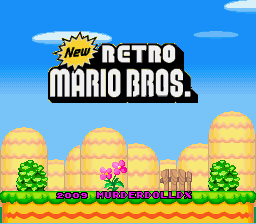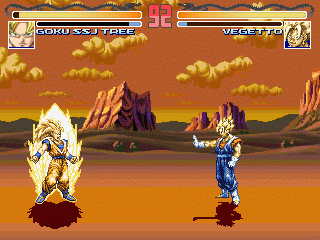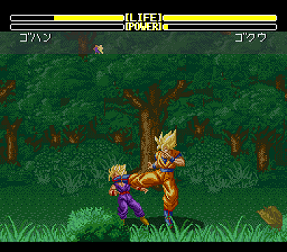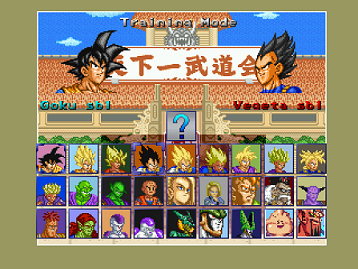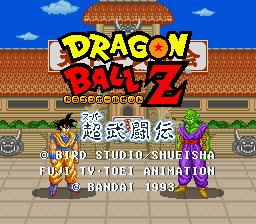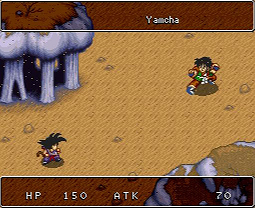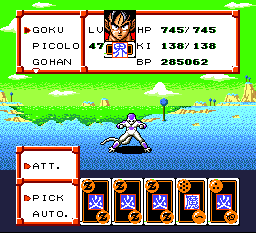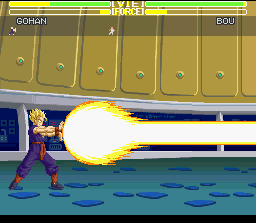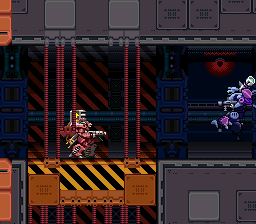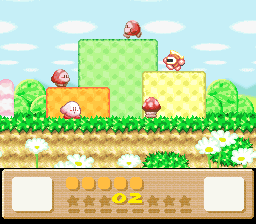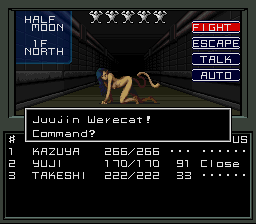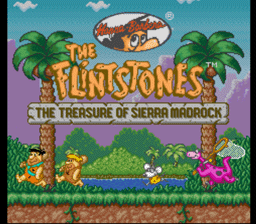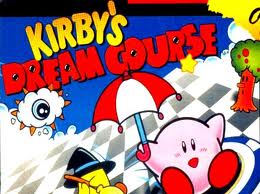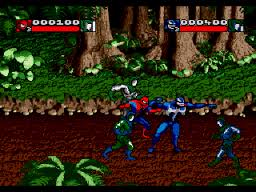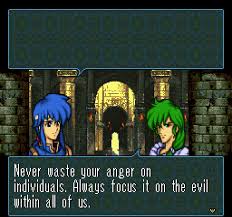Category: Action
732 game(s)All Action games for SNES
Dragon Ball Z - Hyper Dimension
Dragon Ball Z (Japanese: ドラゴンボールZ(ゼット), Hepburn: Doragon Bōru Zetto, commonly abbreviated as DBZ) is a Japanese anime television series produced by Toei Animation. Dragon Ball Z is the sequel to the Dragon Ball anime and adapts the last 325 chapters of the original 519-chapter Dragon Ball manga series created by Akira Toriyama, that were published from 1988 to 1995 in Weekly Shōnen Jump. Dragon Ball Z first aired in Japan on Fuji TV from April 25, 1989 to January 31, 1996, before being dubbed in several territories around the world, including the United States, Australia, Europe, India, and Latin America.
Dragon Ball Z follows the adventures of the protagonist Goku who, along with his companions, defends the Earth against an assortment of villains ranging from intergalactic space fighters and conquerors, unnaturally powerful androids and near indestructible magical creatures. While the original Dragon Ball anime followed Goku from his childhood into adulthood, Dragon Ball Z is a continuation of his adult life, but at the same time parallels the maturation of his son, Gohan, as well as the evolution of his rivals Piccolo and Vegeta from enemies into allies.
Due to the success of the anime in America, the manga chapters comprising its story were released by Viz Media under the title Dragon Ball Z. Additional works called animanga were released, which adapt the animation to manga form. Dragon Ball Z's popularity has spawned numerous releases which have come to represent the majority of content in the Dragon Ball universe; including 14 movies and 148 video games, many of them being only released in Japan, and a host of soundtracks stemming from this material. Dragon Ball Z remains a cultural icon through numerous adaptations, including a remastered broadcast as Dragon Ball Kai (ドラゴンボール改(カイ), Doragon Bōru Kai, lit. "Dragon Ball Revised") from 2009 to 2011 and from 2014 onwards.
Dragon Ball Z - Super Butouden 2
Dragon Ball Z (Japanese: ドラゴンボールZ(ゼット), Hepburn: Doragon Bōru Zetto, commonly abbreviated as DBZ) is a Japanese anime television series produced by Toei Animation. Dragon Ball Z is the sequel to the Dragon Ball anime and adapts the last 325 chapters of the original 519-chapter Dragon Ball manga series created by Akira Toriyama, that were published from 1988 to 1995 in Weekly Shōnen Jump. Dragon Ball Z first aired in Japan on Fuji TV from April 25, 1989 to January 31, 1996, before being dubbed in several territories around the world, including the United States, Australia, Europe, India, and Latin America.
Dragon Ball Z follows the adventures of the protagonist Goku who, along with his companions, defends the Earth against an assortment of villains ranging from intergalactic space fighters and conquerors, unnaturally powerful androids and near indestructible magical creatures. While the original Dragon Ball anime followed Goku from his childhood into adulthood, Dragon Ball Z is a continuation of his adult life, but at the same time parallels the maturation of his son, Gohan, as well as the evolution of his rivals Piccolo and Vegeta from enemies into allies.
Due to the success of the anime in America, the manga chapters comprising its story were released by Viz Media under the title Dragon Ball Z. Additional works called animanga were released, which adapt the animation to manga form. Dragon Ball Z's popularity has spawned numerous releases which have come to represent the majority of content in the Dragon Ball universe; including 14 movies and 148 video games, many of them being only released in Japan, and a host of soundtracks stemming from this material. Dragon Ball Z remains a cultural icon through numerous adaptations, including a remastered broadcast as Dragon Ball Kai (ドラゴンボール改(カイ), Doragon Bōru Kai, lit. "Dragon Ball Revised") from 2009 to 2011 and from 2014 onwards.
Dragon Ball Z - Super Butouden
Dragon Ball Z (Japanese: ドラゴンボールZ(ゼット), Hepburn: Doragon Bōru Zetto, commonly abbreviated as DBZ) is a Japanese anime television series produced by Toei Animation. Dragon Ball Z is the sequel to the Dragon Ball anime and adapts the last 325 chapters of the original 519-chapter Dragon Ball manga series created by Akira Toriyama, that were published from 1988 to 1995 in Weekly Shōnen Jump. Dragon Ball Z first aired in Japan on Fuji TV from April 25, 1989 to January 31, 1996, before being dubbed in several territories around the world, including the United States, Australia, Europe, India, and Latin America.
Dragon Ball Z follows the adventures of the protagonist Goku who, along with his companions, defends the Earth against an assortment of villains ranging from intergalactic space fighters and conquerors, unnaturally powerful androids and near indestructible magical creatures. While the original Dragon Ball anime followed Goku from his childhood into adulthood, Dragon Ball Z is a continuation of his adult life, but at the same time parallels the maturation of his son, Gohan, as well as the evolution of his rivals Piccolo and Vegeta from enemies into allies.
Due to the success of the anime in America, the manga chapters comprising its story were released by Viz Media under the title Dragon Ball Z. Additional works called animanga were released, which adapt the animation to manga form. Dragon Ball Z's popularity has spawned numerous releases which have come to represent the majority of content in the Dragon Ball universe; including 14 movies and 148 video games, many of them being only released in Japan, and a host of soundtracks stemming from this material. Dragon Ball Z remains a cultural icon through numerous adaptations, including a remastered broadcast as Dragon Ball Kai (ドラゴンボール改(カイ), Doragon Bōru Kai, lit. "Dragon Ball Revised") from 2009 to 2011 and from 2014 onwards.
Dragon Ball Z - Super Gokuuden Kakusei Hen
Dragon Ball Z - Super Gokuuden Totsugeki Hen
Dragon Ball Z (Japanese: ドラゴンボールZ(ゼット), Hepburn: Doragon Bōru Zetto, commonly abbreviated as DBZ) is a Japanese anime television series produced by Toei Animation. Dragon Ball Z is the sequel to the Dragon Ball anime and adapts the last 325 chapters of the original 519-chapter Dragon Ball manga series created by Akira Toriyama, that were published from 1988 to 1995 in Weekly Shōnen Jump. Dragon Ball Z first aired in Japan on Fuji TV from April 25, 1989 to January 31, 1996, before being dubbed in several territories around the world, including the United States, Australia, Europe, India, and Latin America.
Dragon Ball Z follows the adventures of the protagonist Goku who, along with his companions, defends the Earth against an assortment of villains ranging from intergalactic space fighters and conquerors, unnaturally powerful androids and near indestructible magical creatures. While the original Dragon Ball anime followed Goku from his childhood into adulthood, Dragon Ball Z is a continuation of his adult life, but at the same time parallels the maturation of his son, Gohan, as well as the evolution of his rivals Piccolo and Vegeta from enemies into allies.
Due to the success of the anime in America, the manga chapters comprising its story were released by Viz Media under the title Dragon Ball Z. Additional works called animanga were released, which adapt the animation to manga form. Dragon Ball Z's popularity has spawned numerous releases which have come to represent the majority of content in the Dragon Ball universe; including 14 movies and 148 video games, many of them being only released in Japan, and a host of soundtracks stemming from this material. Dragon Ball Z remains a cultural icon through numerous adaptations, including a remastered broadcast as Dragon Ball Kai (ドラゴンボール改(カイ), Doragon Bōru Kai, lit. "Dragon Ball Revised") from 2009 to 2011 and from 2014 onwards.
Dragon Ball Z - Super Saiya Densetsu
Dragon Ball Z - Ultime Menace
Dragon Ball Z (Japanese: ドラゴンボールZ(ゼット), Hepburn: Doragon Bōru Zetto, commonly abbreviated as DBZ) is a Japanese anime television series produced by Toei Animation. Dragon Ball Z is the sequel to the Dragon Ball anime and adapts the last 325 chapters of the original 519-chapter Dragon Ball manga series created by Akira Toriyama, that were published from 1988 to 1995 in Weekly Shōnen Jump. Dragon Ball Z first aired in Japan on Fuji TV from April 25, 1989 to January 31, 1996, before being dubbed in several territories around the world, including the United States, Australia, Europe, India, and Latin America.
Dragon Ball Z follows the adventures of the protagonist Goku who, along with his companions, defends the Earth against an assortment of villains ranging from intergalactic space fighters and conquerors, unnaturally powerful androids and near indestructible magical creatures. While the original Dragon Ball anime followed Goku from his childhood into adulthood, Dragon Ball Z is a continuation of his adult life, but at the same time parallels the maturation of his son, Gohan, as well as the evolution of his rivals Piccolo and Vegeta from enemies into allies.
Due to the success of the anime in America, the manga chapters comprising its story were released by Viz Media under the title Dragon Ball Z. Additional works called animanga were released, which adapt the animation to manga form. Dragon Ball Z's popularity has spawned numerous releases which have come to represent the majority of content in the Dragon Ball universe; including 14 movies and 148 video games, many of them being only released in Japan, and a host of soundtracks stemming from this material. Dragon Ball Z remains a cultural icon through numerous adaptations, including a remastered broadcast as Dragon Ball Kai (ドラゴンボール改(カイ), Doragon Bōru Kai, lit. "Dragon Ball Revised") from 2009 to 2011 and from 2014 onwards.
Metal Warriors
Metal Warriors is a 1995 action platformer video game developed by LucasArts and published by Konami for the Super Nintendo Entertainment System. The game was released exclusively in North America in April 1995.
Kirby's Dream Land 3
Kirby's Dream Land 3, known as Hoshi no Kirby 3 (星のカービィ3 Hoshi no Kābī Surī?, lit. "Kirby of the Stars 3") in Japan, is the fifth platformer video game starring Kirby. Specifically, it is the third game under the Kirby's Dream Land name. Although the first two games were largely unrelated, Dream Land 3 features many similar characters to Dream Land 2. Kirby 64: The Crystal Shards was the sequel to this game.
Kirby's Dream Land 3 is the last first party game released for the Super NES in North America, although it is not the final game for the system (the 1998 Super NES version of Frogger would be the final game in North America, while the 2000 Super Famicom remake of Metal Slader Glory was the final game in Japan). Problems with the game's PAL conversion prevented it from being released in Europe and Australia for many years; it was finally released for the Virtual Console in those regions in the form of an import from North America on July 24, 2009 for the Wii and on July 25, 2013 for the Wii U.[citation needed] The game was re-released on the Virtual Console in North America on January 5, 2009 for the Wii[1] and on May 8, 2013 for the Wii U and in Japan on April 28, 2009 for the Wii and on May 8, 2013 for the Wii U. It was also included along with 5 other Kirby games in the Wii collection for Kirby's 20th anniversary, Kirby's Dream Collection.
Shin Megami Tensei
The Flintstones: The Treasure of Sierra Madrock
The Flintstones: The Treasure of Sierra Madrock is a side scrolling action video game by Taito for the Super Nintendo Entertainment System. The story of the game is generally based on the 1960s The Flintstones cartoon series. In the opening story of the game, the Water Buffalos' leader decides to retire. As his last decree as Great Poobah, he makes a contest in which whoever finds the Treasure of Sierra Madrock will be his successor. In the game, Fred Flintstone and Barney Rubble must find the treasure before any other Buffalo member (or even their wives, Wilma and Betty). The game features passwords that must be written down in order to continue the game from the highest level reached.
Kirby's Dream Course
Kirby's Dream Course (Kirby Bowl (カービィボウル Kābī Bouru?) in Japan) is a 1994 golf video game developed by HAL Laboratory and published by Nintendo for the Super Nintendo Entertainment System video game console. It was first released in Japan on September 21, 1994, in North America on February 1, 1995, and in Europe in 1995. It is one of four Kirby video games released for the Super Nintendo Entertainment System.
Spider-Man And Venom: Separation Anxiety
Venom/Spider-Man: Separation Anxiety is a side-scrolling beat 'em up video game and sequel to Spider-Man and Venom: Maximum Carnage, released for Sega Genesis and Super NES and then ported to PC. One or two players team up as Spider-Man and Venom to defeat the evil symbiote Carnage. The game boasts a large number of thugs that the player has to defeat: heavily armed Jury and Venom's symbiote children. There is also cameo assistance from Captain America, Ghost Rider, Hawkeye, and Daredevil.
Fire Emblem - Seisen no Keifu English Translation
Fire Emblem (ファイアーエムブレム, Faiā Emuburemu?) is a fantasy tactical role-playing video game franchise developed by Nintendo's Intelligent Systems division and published by Nintendo. The Fire Emblem series is well known for its innovation and for being one of the first Eastern style tactical role-playing games, with a strong emphasis on Western forms of medieval fantasy. The series is also renowned for having deeply developed characters, as well as the fact that most units' death—or defeat in battle—is permanent in the game until the end of the playthrough. The series currently spans thirteen games, and has been released on the Family Computer, Super Famicom, Game Boy Advance, GameCube, Nintendo DS, Wii and Nintendo 3DS.
All games in the series were exclusive to Japan until 2003, when the seventh game in the series was released internationally under the title Fire Emblem, largely due to the popularity of Fire Emblem characters Marth and Roy in Super Smash Bros. Melee. Fire Emblem was designed specifically with newcomers to the series in mind, and the first ten chapters were structured in a manner that eased newcomers into the gameplay. All Fire Emblem games produced since have also been released internationally, except for Fire Emblem: Shin Monshō no Nazo: Hikari to Kage no Eiyū on the Nintendo DS.
